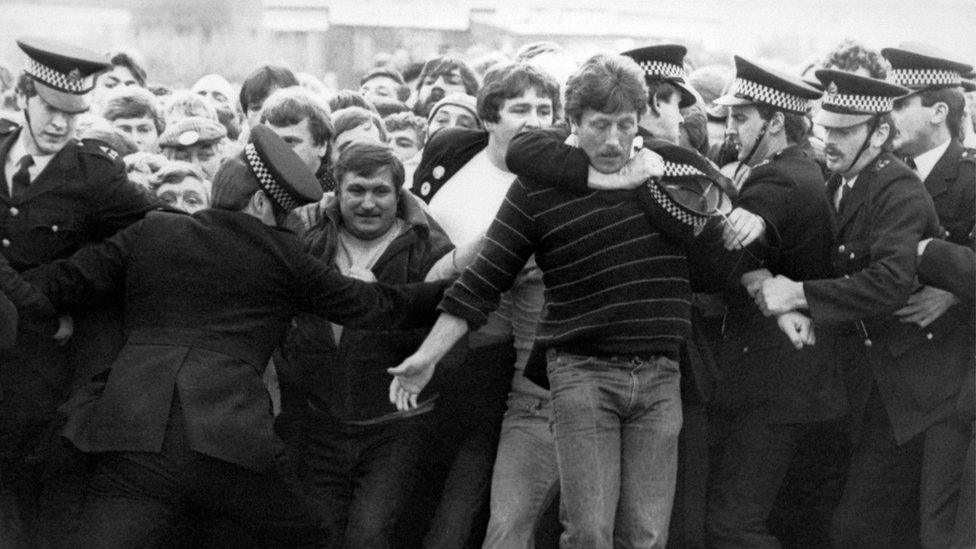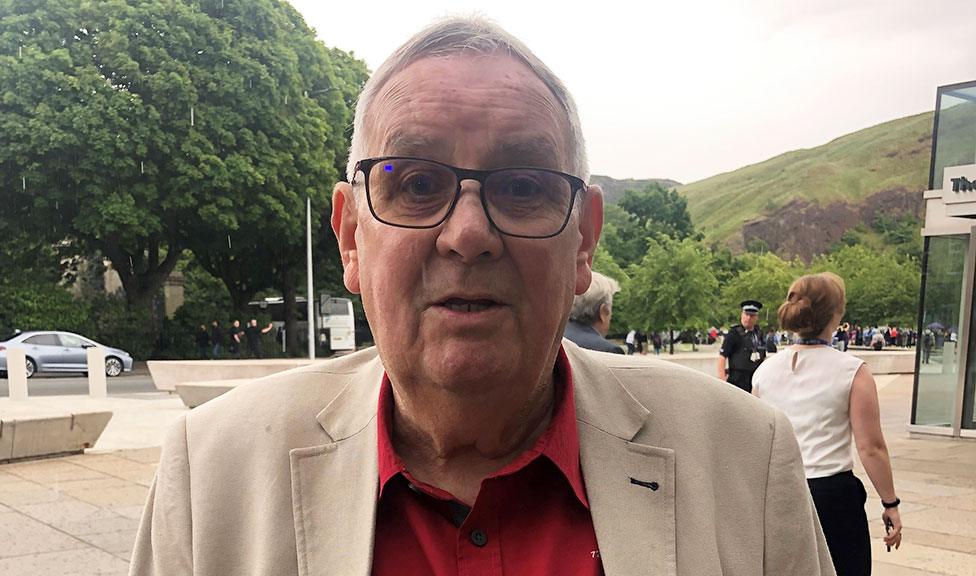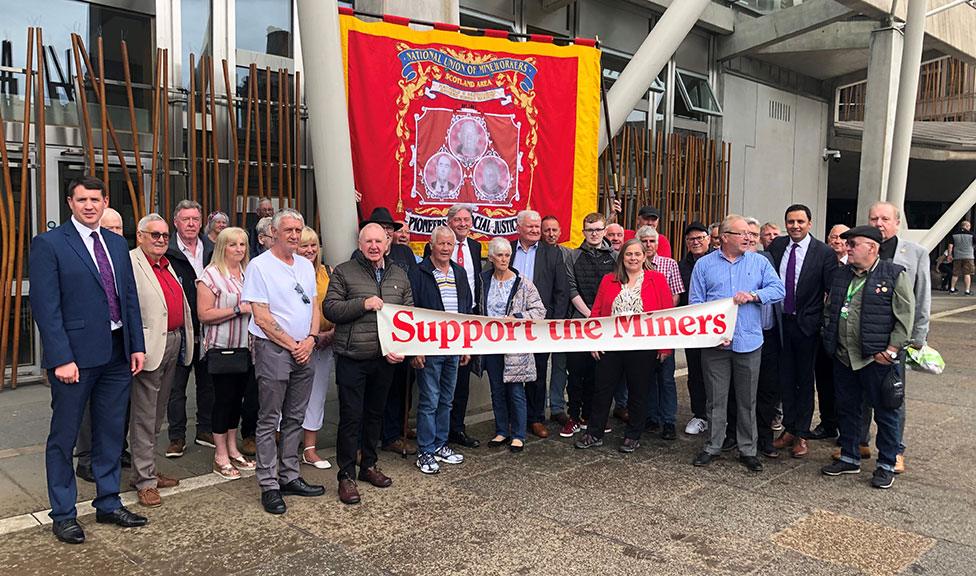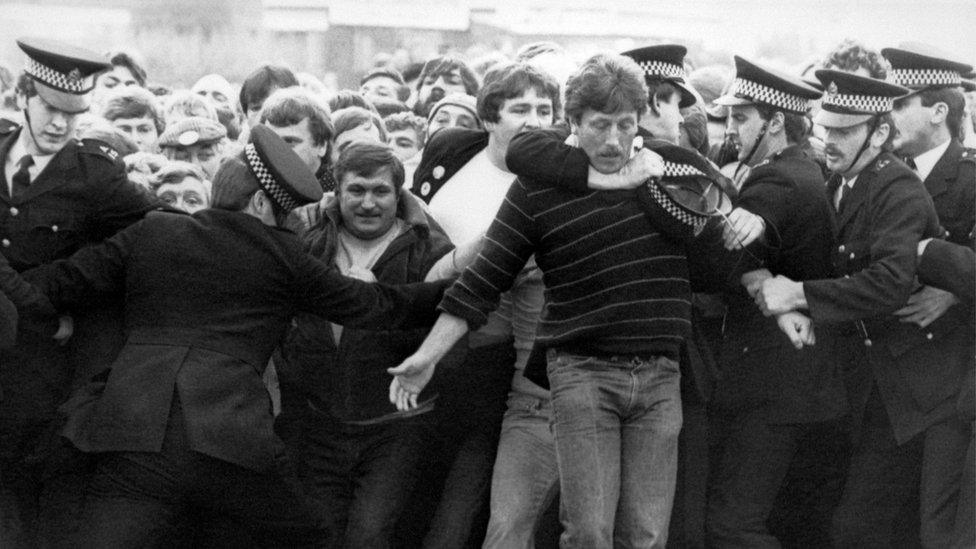Pardon for convicted miners but no compensation
- Published

About 1,400 miners were arrested and more than 500 were convicted during the strike
Miners convicted of offences relating to strike action in Scotland in the 1980s will be pardoned following a vote by MSPs.
But their convictions will not be quashed and they will not receive compensation.
The Miners' Strike Pardon Bill, external was passed by MSPs at Holyrood following the recommendations of an independent report.
The move was welcomed by miners but some called for it go further.
They say they lost out financially because they lost their jobs and were blacklisted following their convictions. It meant they were also denied redundancy payments.
The Scottish government said the bill was about "reconciliation rather than compensation" and it was up to the UK government to devise a compensation scheme.
In Scotland about 1,400 miners were arrested and more than 500 were convicted during the national dispute .
Under the new legislation, people convicted of breach of the peace, breach of bail conditions, or obstructing the police while taking part in strike action will be pardoned.
Miners will not need to apply for a pardon as it will apply automatically.
The pardon will also apply to miners who have died since the 1984-85 strike.
However, it will not affect their conviction or sentence and they will not be entitled to compensation.
Due to the length of time that has passed, most - if not all - convictions will already be spent.
'The pardon clears my name... but it should go further'

Alex Bennet lost his jobs within weeks of being convicted of a breach of a peace
Alex Bennet had never before been in trouble with the police until he was arrested at Bilston Glen colliery in Midlothian on 25 June 1984.
He was eventually charged with a breach of the peace. Within a few months, he lost his job.
"I went to court - I've still got the dates in my head, I'll never forget - on the 20 Dec 1984 and I was found guilty of a breach of the peace," he said.
"On 30 January, I got my P45 through the post, without an interview, nobody spoke to me and it was a shock. Although it wasn't unexpected because it had happened to other people."
After that, he said, he couldn't get a job and was blacklisted.
"The pardon means it clears our name," Mr Bennett said. "I'm no longer a criminal, a threat to society as they would have you believe at the time, and it goes some way to address that."

Former miners held a rally outside the Scottish Parliament
He said he eventually won an employment tribunal but the compensation he received was substantially less than what he would later have been entitled to in redundancy payments.
"It didn't just affect me, I had two kids at the school at the time. It affected them as well," he said.
And he criticised Scottish ministers for failing to draw up plans for compensation.
"The Scottish government has blinkers on," he said. "We were arrested by Scottish police, fined in Scottish courts, blacklisted by the coal board in Scotland.
"Miners from Durham or Yorkshire arrested at BIlston Glen with me - none of them were sacked. They all kept their jobs. It was only Scottish miners who were targeted, and I think the Scottish Parliament should address that.
"It's day of justice for some extent but I think they should go further."
'Symbolic, collective, automatic'
An amendment from Scottish Labour's Richard Leonard requiring ministers to carry out a review into how to compensate those receiving a pardon was rejected.
Mr Leonard said the pardons were long overdue and it was "gravely disappointing" that the government refused to back the miners' request for compensation.
The bill was drawn up following an independent review by John Scott QC, external into the impact of policing on Scottish communities during the strike.
It recommended a "symbolic, collective and automatic pardon", the Scottish government said.
They said they sympathised with miners who lost out on redundancy payments and pension rights but it was up to the UK government to pay compensation.
Justice Secretary Keith Brown said: "By securing this pardon, we have done what we can within our powers to restore dignity to individuals who meet the qualifying criteria and their families.
"It is now right that the UK government recognises the passing of this historic legislation and gives further consideration to a UK-wide public inquiry and the payment of compensation to former miners.
"I have written to the Home Secretary this week urging her to reconsider her position given the strong support for this landmark bill."
Related topics
- Published28 October 2021

- Published7 June 2018
